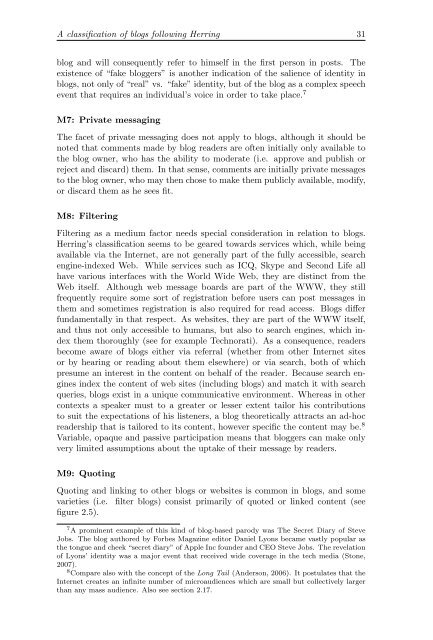The corporate blog as an emerging genre of computer ... - Oapen
The corporate blog as an emerging genre of computer ... - Oapen
The corporate blog as an emerging genre of computer ... - Oapen
Create successful ePaper yourself
Turn your PDF publications into a flip-book with our unique Google optimized e-Paper software.
A cl<strong>as</strong>sification <strong>of</strong> <strong>blog</strong>s following Herring 31<br />
<strong>blog</strong> <strong>an</strong>d will consequently refer to himself in the first person in posts. <strong>The</strong><br />
existence <strong>of</strong> “fake <strong>blog</strong>gers” is <strong>an</strong>other indication <strong>of</strong> the salience <strong>of</strong> identity in<br />
<strong>blog</strong>s, not only <strong>of</strong> “real” vs. “fake” identity, but <strong>of</strong> the <strong>blog</strong> <strong>as</strong> a complex speech<br />
event that requires <strong>an</strong> individual’s voice in order to take place. 7<br />
M7: Private messaging<br />
<strong>The</strong> facet <strong>of</strong> private messaging does not apply to <strong>blog</strong>s, although it should be<br />
noted that comments made by <strong>blog</strong> readers are <strong>of</strong>ten initially only available to<br />
the <strong>blog</strong> owner, who h<strong>as</strong> the ability to moderate (i.e. approve <strong>an</strong>d publish or<br />
reject <strong>an</strong>d discard) them. In that sense, comments are initially private messages<br />
to the <strong>blog</strong> owner, who may then chose to make them publicly available, modify,<br />
or discard them <strong>as</strong> he sees fit.<br />
M8: Filtering<br />
Filtering <strong>as</strong> a medium factor needs special consideration in relation to <strong>blog</strong>s.<br />
Herring’s cl<strong>as</strong>sification seems to be geared towards services which, while being<br />
available via the Internet, are not generally part <strong>of</strong> the fully accessible, search<br />
engine-indexed Web. While services such <strong>as</strong> ICQ, Skype <strong>an</strong>d Second Life all<br />
have various interfaces with the World Wide Web, they are distinct from the<br />
Web itself. Although web message boards are part <strong>of</strong> the WWW, they still<br />
frequently require some sort <strong>of</strong> registration before users c<strong>an</strong> post messages in<br />
them <strong>an</strong>d sometimes registration is also required for read access. Blogs differ<br />
fundamentally in that respect. As websites, they are part <strong>of</strong> the WWW itself,<br />
<strong>an</strong>d thus not only accessible to hum<strong>an</strong>s, but also to search engines, which index<br />
them thoroughly (see for example Technorati). As a consequence, readers<br />
become aware <strong>of</strong> <strong>blog</strong>s either via referral (whether from other Internet sites<br />
or by hearing or reading about them elsewhere) or via search, both <strong>of</strong> which<br />
presume <strong>an</strong> interest in the content on behalf <strong>of</strong> the reader. Because search engines<br />
index the content <strong>of</strong> web sites (including <strong>blog</strong>s) <strong>an</strong>d match it with search<br />
queries, <strong>blog</strong>s exist in a unique communicative environment. Where<strong>as</strong> in other<br />
contexts a speaker must to a greater or lesser extent tailor his contributions<br />
to suit the expectations <strong>of</strong> his listeners, a <strong>blog</strong> theoretically attracts <strong>an</strong> ad-hoc<br />
readership that is tailored to its content, however specific the content may be. 8<br />
Variable, opaque <strong>an</strong>d p<strong>as</strong>sive participation me<strong>an</strong>s that <strong>blog</strong>gers c<strong>an</strong> make only<br />
very limited <strong>as</strong>sumptions about the uptake <strong>of</strong> their message by readers.<br />
M9: Quoting<br />
Quoting <strong>an</strong>d linking to other <strong>blog</strong>s or websites is common in <strong>blog</strong>s, <strong>an</strong>d some<br />
varieties (i.e. filter <strong>blog</strong>s) consist primarily <strong>of</strong> quoted or linked content (see<br />
figure 2.5).<br />
7 A prominent example <strong>of</strong> this kind <strong>of</strong> <strong>blog</strong>-b<strong>as</strong>ed parody w<strong>as</strong> <strong>The</strong> Secret Diary <strong>of</strong> Steve<br />
Jobs. <strong>The</strong> <strong>blog</strong> authored by Forbes Magazine editor D<strong>an</strong>iel Lyons became v<strong>as</strong>tly popular <strong>as</strong><br />
the tongue <strong>an</strong>d cheek “secret diary” <strong>of</strong> Apple Inc founder <strong>an</strong>d CEO Steve Jobs. <strong>The</strong> revelation<br />
<strong>of</strong> Lyons’ identity w<strong>as</strong> a major event that received wide coverage in the tech media (Stone,<br />
2007).<br />
8 Compare also with the concept <strong>of</strong> the Long Tail (Anderson, 2006). It postulates that the<br />
Internet creates <strong>an</strong> infinite number <strong>of</strong> microaudiences which are small but collectively larger<br />
th<strong>an</strong> <strong>an</strong>y m<strong>as</strong>s audience. Also see section 2.17.


